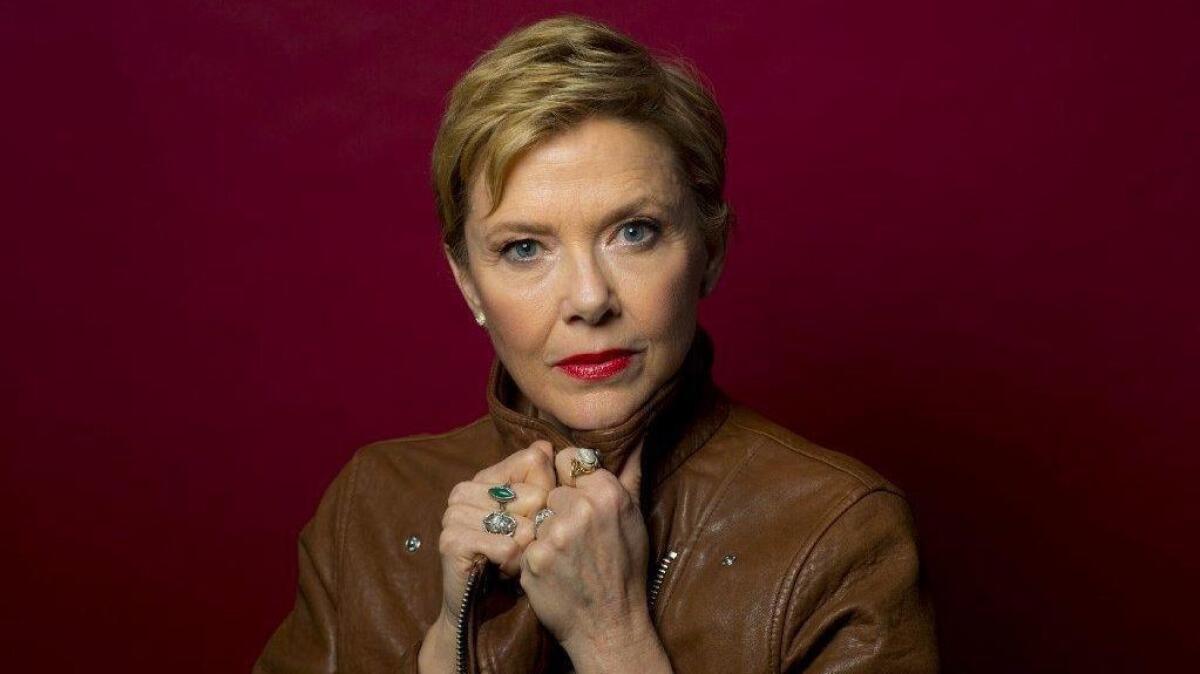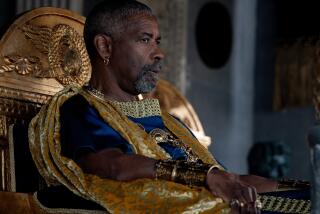Annette Bening wonders: Can kids and parents ever truly know one another?

- Share via
To appreciate how an actor artfully navigates the constant, bicoastal demands of awards season, it’s helpful to peek inside Annette Bening’s takeout coffee container.
Not long ago, the four-time Oscar nominee breezed into the lobby of the London Hotel in West Hollywood, trailed by Warren Beatty, her husband of 24 years. They were there in the late evening to participate in an intimate Q&A supporting Beatty’s latest movie, “Rules Don’t Apply.” Bening looked remarkably fresh for someone who had been in New York attending the Gotham Awards just the night before.
Her secret? Bening smiled, opening the plastic lid of the coffee cup, revealing the red wine inside.
“You get the hang of these things when you’ve been around for a while,” Bening, 58, said. Beatty cocked his head, looked in the cup and nodded. “Listen to her. She knows what she’s talking about.”

Annette Bening discusses her “20th Century Women” character and working with young costars including Greta Gerwig and Elle Fanning.
That’s so Annette. She has this rebellious Cheshire cat quality to her. You never know what she’s going to be up to.
— Mike Mills
That much, it seems, just about everyone can agree on. Mike Mills, who directed Bening in “20th Century Women,” a movie he also wrote, laughs uproariously when told the furtive wine story.
“That’s so Annette,” Mills said by phone. “She has this rebellious Cheshire cat quality to her. You never know what she’s going to be up to.”
Mills did not write the character of Dorothea, the mysterious single mother — free-spirited at times, controlling at others — at the heart of “20th Century Women,” with Bening in mind. The melancholy film, set in Santa Barbara circa 1979, largely focuses on Dorothea enlisting the help of two younger women (played by Greta Gerwig and Elle Fanning) to teach her teenage son (Lucas Jade Zumann) how to be a good man.
Mills based Dorothea on his late mother, Jan Mills, a woman he calls a mix of “Amelia Earhart and Humphrey Bogart — but heavier on the Bogart.”
When Bening responded to his script, he was thrilled. And because of the way she, as Mills puts it, “took the character and digested it and made it hers,” he can no longer think of Dorothea as anything but Bening.
“Casting is like finding a lover … you don’t know why you picked a person until a month into working with them,” Mills said. “And then it was like, ‘Oh. You really are so much like my mom.’ They’re both Geminis. And they’re both allergic to the obvious. My mother would never do what you thought she would do and neither does Annette.”
Over a long conversation at the London, a few weeks after the “Rules Don’t Apply” event, Bening exuded the sort of inscrutability that Mills described (“she’s a very secretive person in a lot of ways”), amiably avoiding queries about parallels between her own mothering and Dorothea’s approach.
But she would allow that one of the things she really responded to in Mills’ screenplay was the bittersweet reality that parents rarely see their children authentically because the elders’ presence always changes the dynamic in the room. Parents want to know their children, Bening says. And, at some point, the kids want to understand what their parents are all about, if only to help themselves sort through life’s vagaries.
“That longing is there, even in very good relationships filled with love,” Bening said. “And it’s probably a longing that can never be fully erased. I mean, do we ever really fully know ourselves?”
Bening’s own parents are still alive — her father is 90, her mom is 87 — and live in the same five-bedroom, east San Diego Spanish ranch house they bought when she was a kid. Their age, along with the questions “20th Century Women” raises, has her thinking about having a conversation with them to fill in some of the blanks about their lives. Or she might do what a friend did and have someone else conduct a taped interview with them. (“With parents, there are certain things they would tell a stranger that they wouldn’t tell you,” Bening said.)
For her own offspring, she believes what’s most important is for them “to see you as someone who’s trying.”
Bening and Beatty have four children together, ranging in age from 25 to 16. Beatty has taken to describing them as “four small Eastern European countries that live in our house,” though in reality, their youngest daughter is the only one “officially” still living at home. Bening called her husband’s description “hilarious and true, to a degree.”
The tables have definitely turned to where you think you’re there to teach them when they’re little and now it’s all about learning from them.
— Annette Bening
“The tables have definitely turned to where you think you’re there to teach them when they’re little and now it’s all about learning from them,” Bening said. “And I like that shift. I like them out there doing their own thing.”
What she doesn’t particularly like is the pressure that she believes many millennials feel to constantly be chronicling their lives and curating their images on social media. In “20th Century Women,” Dorothea looks at the liberated young women coming of age in late ’70s Southern California, like the one handing her son a copy of “Our Bodies, Ourselves,” and wonders what it’d be like to grow up as part of that generation.
Bening harbors no such thoughts about her own daughters’ era.
“Recently, especially, having been out in the press more, I feel really grateful that I’m in the generation I’m in,” Bening said. “I’m not into social media. I don’t have a Facebook account. And I’m glad. That’s not my world.” She pauses a moment, considering, and her curiosity starts to get the better of her. “I mean, it would be fascinating. There’s many positive parts. The way they’re connected to people and can stay connected to people. That’s a profound change. What are the ramifications? We don’t know yet.”
“But I really think privacy is a precious thing,” she continued. “In my profession, privacy gives me more freedom. My responsibility is to be as open as I can in my work. But beyond that, I have my boundaries. We all have our ups and downs, but I don’t think we have to share them on social media to make them meaningful.” Another pause. “Not that I’m judging that. But I couldn’t do it and maintain my own sanity. And that’s a precious thing, too — sanity. Especially these days.”
See the most-read stories this hour »
Twitter: @glennwhipp
More to Read
From the Oscars to the Emmys.
Get the Envelope newsletter for exclusive awards season coverage, behind-the-scenes stories from the Envelope podcast and columnist Glenn Whipp’s must-read analysis.
You may occasionally receive promotional content from the Los Angeles Times.










